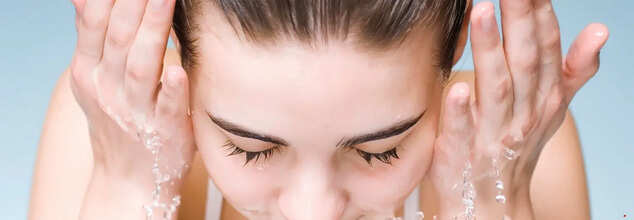
Credit: Canva
Should You Wash Your Face With Salt Water?
In the realm of skincare, home remedies have long been a go-to for many, and one such trend gaining popularity is washing the face with salt water. From acne reduction to skin detoxification, the humble salt solution is being praised on social media. But does it really live up to the hype? And more importantly, is it safe for everyday use?
Salt water, particularly when derived from natural sea water, contains minerals like magnesium, calcium, and potassium. These elements are known for their antibacterial and anti-inflammatory properties. This is one reason why a dip in the ocean often leaves the skin feeling refreshed and rejuvenated. Some people replicate this effect at home by mixing sea salt with warm water and using it as a facial rinse.
Dermatologists agree that salt water does have certain benefits—when used in moderation. “Salt water can help cleanse the skin, reduce oiliness, and calm mild inflammation,” says Dr. Nisha Verma, a Mumbai-based dermatologist. “It can be particularly useful for people with acne-prone or oily skin because salt has natural antiseptic properties that can help reduce bacteria and unclog pores.”
However, experts caution against daily use or using high concentrations of salt. Salt is a natural dehydrator—it draws water out of cells. This means overuse can strip the skin of its natural moisture, leading to dryness, irritation, or even flaking. People with dry, sensitive, or eczema-prone skin are especially advised to steer clear of salt-based treatments unless under medical supervision.
In a controlled routine, salt water can be used as a toner or rinse a few times a week. The solution should be mild—usually one teaspoon of sea salt dissolved in half a cup of warm water. After application, it's crucial to moisturize to restore the skin’s hydration barrier.
Anecdotal reports also suggest that salt water may help reduce blackheads and tighten pores, but these claims lack solid scientific backing. “Most of the positive effects are temporary,” says Dr. Verma. “It’s not a substitute for a good skincare routine or prescribed treatment for chronic conditions like acne or rosacea.”
There’s also a growing trend of using Himalayan pink salt or Dead Sea salt for their mineral content. While these may offer a slight edge due to their rich composition, the core principles remain the same—moderation and proper dilution are key.
For those with skin infections or open wounds, dermatologists strongly discourage the use of salt water. It may sting and irritate the area, delaying healing. Similarly, those undergoing treatments like chemical peels or retinol-based regimens should avoid salt rinses as it can lead to increased sensitivity.
In conclusion, while washing your face with salt water may offer certain skin benefits, it is not a one-size-fits-all solution. Used correctly, it can be a helpful occasional addition to your skincare regimen—but relying on it daily or overusing it could do more harm than good.
As always, consult a dermatologist before incorporating any new treatment into your routine—especially one that could affect your skin’s natural barrier.

Credit: Canva
Poor Dental Health May Trigger Fibromyalgia and Headaches—Here's How to Protect Your Teeth
You probably know that inadequately brushing can increase your risk of tooth decay, gum diseases and bad breath. But researchers in Australia have discovered that it can do much worse than this. The research, published in the journal Frontiers in Pain Research, discovered a surprising link between poor oral hygiene and body aches, migraines and stomach pain, especially in women.
The researchers concluded that women with worse oral health are significantly more likely to suffer from pain, including frequent headaches and conditions like fibromyalgia. Fibromyalgia is a chronic condition characterized by widespread musculoskeletal pain — including headaches — as well as fatigue, sleep disturbances and cognitive problems. They explained that it was because tiny microbes in the mouth that might be messing with the nervous system.
For this new study, researchers analyzed the data of 186 women—67% of whom had fibromyalgia—and found that those with the worst dental health were 60% more likely to suffer moderate to severe body pain and nearly 50% more likely to report migraine headaches. Thus, they concluded that the more severe their head hurt, the worse their mouth looked.
"This is the first study to investigate oral health, oral microbiota and pain commonly experienced in women with fibromyalgia, with our study showing a clear and significant association between poor oral health and pain," said lead author Dr Joanna Harnett, an associate professor at the University of Sydney School of Pharmacy. “Our findings are particularly important to fibromyalgia which, despite being a common rheumatological condition, is often under-recognized," co-author Sharon Erdrich added.
Here's How You Can Take Care Of Your Dental Health
Taking care of dental health is important. These are a few things you can do to take care of your dental health.
- Brush Before Breakfast: UK dental surgeon Shaadi Manouchehri advises brushing before eating breakfast to remove the bacteria that builds up overnight. This practice shields your teeth from acidic food and drinks that can weaken enamel.
- Choose Healthy Snacks: Opt for raw vegetables, nuts, or fruits that are low in sugar and require chewing, which stimulates saliva production and naturally cleans the teeth.
- Use Xylitol Gum: Chewing gum with xylitol after meals can boost saliva flow and reduce the risk of cavities.
- Wait Before Brushing After Meals: If you prefer to brush after eating, wait at least 30 minutes to allow your enamel to re-mineralize and harden.
Moreover, here are a few things you should avoid:
Avoid Sugary Snacks: Fermentable carbohydrates, such as chips, crackers, and cereal, turn into sugars that fuel the growth of harmful bacteria in the mouth.
- Skip Brushing After Acidic Meals: Acidic foods and drinks can weaken your enamel. Brushing immediately after consumption can wear away the softened enamel, leading to cavities.
- Don’t Skip Hydration: Drink water after meals to help neutralize acids and wash away remaining food particles in your teeth.
Maintaining optimal dental health takes more than just brushing and flossing twice a day. Adding such healthy eating habits, timing your brushing routine, and using xylitol gum after meals, you can protect your teeth from decay and promote stronger enamel.

Brain Christine (Source: Facebook and Urology Centers of Alabama)
Trump's Top Health Nominee Wants ‘Corrective Care’ For Trans People
It is no surprise that whoever President Donald Trump nominates as a top pick for a health position comes with controversies. This time, it is for a key federal health role, which is facing scrutiny for controversial remarks on transgender care and the COVID-19 pandemic. Brain Christine, a 61-year-old urologist from Alabama, publicly advocated for "corrective care" for transgender youth and questioned mainstream narratives around the pandemic.
Who is Brian Christine?
He is President Trump's top pick for assistant secretary for health, a position which was previously held by Dr Rachel Levine, the first openly transgender federal official confirmed by the Senate. Unlike his predecessors, Christine has no experience in the government service. He is however, well-regarded in his medical field, especially for his work in men's sexual health, including treatments for erectile dysfunction.
Christine's nomination marks a trend of Trump selecting individuals with nontraditional background for health leadership roles. If confirmed, he would serve as a deputy to Health and Human Services Secretary Robert F Kennedy Jr.
ALSO READ: 'Why Should Society Pay For Your Health?' RFK Jr. On Those Who Smoke Or Eat Donuts
Controversial Views On Transgender Youth
Christie has preciously also made several public statements which oppose gender-affirming care for transgender minors. While he acknowledged gender dysphoria as a real concern, he also equated it to addiction and believed children should receive "corrective care" such as counseling or pastoral support, instead of medical transitioning.
In one of the interviews from 2023, Christine criticized what he called the "transgender agenda", accusing the political left for using children as "pawns". He also framed transgender rights as part of the broader attack on masculinity, family and religion.
Many major medical organizations in the US, including the American Academy of Pediatrics and the American Medical Association support gender-affirming care as evidence-based and potentially life-saving for transgender youth.
In fact, his views have faced opposition from many LGBTQ+ advocacy groups. Brandon Wolf of the Human Rights Campaign called Christine’s views “dangerous disinformation” and said they pose real harm to children. Critics argue that his stance undermines decades of progress in LGBTQ+ health and rights.
Has Christine Ever Provided Transgender Patient Care?
While he claims that he has never done so, there are past advertisements from his medical practice that suggest otherwise. His website had once promoted treatments for patients who had undergone gender transition. His clinic also placed ads in LGBTQ+ magazines. He has, however, denied these claims, and said he never offered surgical or hormonal care of transgender individuals.
What About COVID-19 Vaccines?
Like RFK Jr., Christine too is riding the bandwagon of his controversial remarks on COVID-19 vaccine. His views on the COVID-19 pandemic have also drawn attention. On his podcast, he once expressed skepticism about the government's pandemic response. He suggested that it was used to influence the 2020 election and benefit large corporation. He also criticized lockdowns for harming small businesses and questioned vaccine mandates. However, he has initially received the vaccine himself.

Credits: Canva
Why Do So Many Men Avoid Fertility Testing?
Conversations around reproductive health are becoming more inclusive—but one significant voice often remains absent: men. Despite data showing that 10% to 15% of men face infertility challenges, male fertility remains shrouded in silence, stigma, and emotional discomfort.
While society has made progress in encouraging men to speak up about mental health and emotional well-being, fertility seems to be the last frontier. Many still perceive it as a “woman’s issue,” even though science tells us otherwise. According to fertility specialist Dr. Mohammed Ashraf C, Scientific Director and Head of Embryology, “There’s a common belief that fertility issues are only a woman’s problem, and that men can’t be affected. For some, the ability to father a child is seen as proof of their manhood.”
From an early age, men are conditioned to associate virility with masculinity. The idea of being able to conceive a child is often treated as a validation of manhood. In many cultures, the role of a man as a father—especially a biological father—is deeply ingrained. This cultural narrative fuels the reluctance to even consider the possibility of infertility.
“Men don’t see a doctor unless something is bleeding or broken,” says Dr. Ashraf, summarizing a mindset that perfectly captures the aversion to proactive reproductive check-ups. Many men simply don’t want to know if something is wrong. Fear of judgment, feelings of shame, and ego can often be stronger than the desire to seek solutions.
Unlike women—who often openly discuss their fertility journeys—men rarely share their struggles. Infertility can lead to a cascade of emotional consequences for men, including isolation, low self-esteem, depression, and relationship stress. “Struggling with infertility and not feeling able to talk about it can lead to men feeling isolated and emotionally disconnected,” Dr. Ashraf notes.
Fertility concerns can even strain intimate relationships. Poor communication between partners can increase stress and impair sexual function, further compounding the issue. Emotional support for both partners is critical, and shared understanding can make the journey less painful.
How is Male Fertility Tested?
One of the biggest deterrents to male fertility testing is misinformation. Many men assume the process is invasive, complicated, or humiliating. In truth, male fertility tests are as routine as checking your blood pressure or cholesterol.
The process typically begins with a sperm analysis and a full reproductive health assessment, including medical history, previous infections, and lifestyle choices. “New sperm are produced every 3 months, so lifestyle changes can dramatically improve sperm health and increase the chances of conception,” says Dr. Ashraf.
This makes testing not only important for conception, but also for long-term health. In fact, male fertility tests can reveal issues like low testosterone or other treatable hormonal imbalances. However, it’s critical to approach treatment cautiously—starting testosterone therapy, for instance, can reduce or halt sperm production. That’s why fertility assessments should always come before any hormone interventions.
Sperm health is more than just a fertility indicator—it’s a window into a man’s overall well-being. Factors like diet, exercise, smoking, alcohol consumption, and age all impact sperm quality. These same factors are also linked to broader chronic health conditions, making sperm health an essential piece of the preventive care puzzle.
According to Dr. Ashraf, “It’s time to break the stigma, talk openly, let go of the shame, and stop thinking fertility is just a women’s issue. Taking that first step doesn’t make you less of a man—it shows you care about your health, your partner, and your future.”
The rise of at-home fertility testing kits is helping more men take that first step discreetly. These innovative tools are user-friendly, private, and can provide quick insights into sperm health—making it easier to move forward with further medical consultations if needed.
Couples facing conception challenges should remember that both partners share equal responsibility in creating a healthy embryo. Open dialogue, mutual support, and equal medical evaluations can help not only in conception but also in strengthening relationships during an emotionally taxing time.
Fertility challenges are not a reflection of masculinity. They are a medical issue—common, treatable, and often preventable. Ignoring the problem does not make it go away. Seeking help is not weakness. It’s empowerment.
Dr Mohammed Ashraf C is an Fertility specialist, Scientific Director, Head of Embryology at Milann Fertility Hospital, Bengaluru in India
© 2024 Bennett, Coleman & Company Limited

